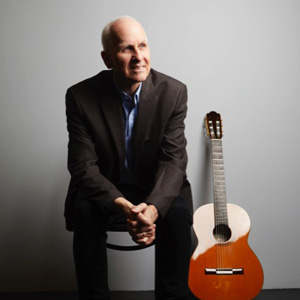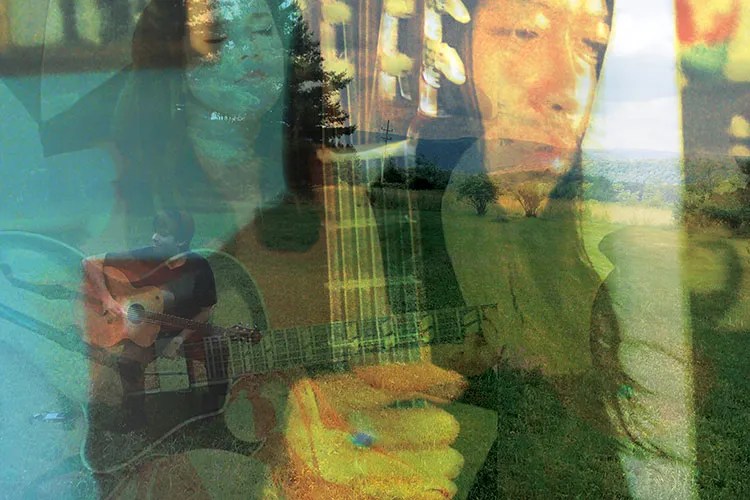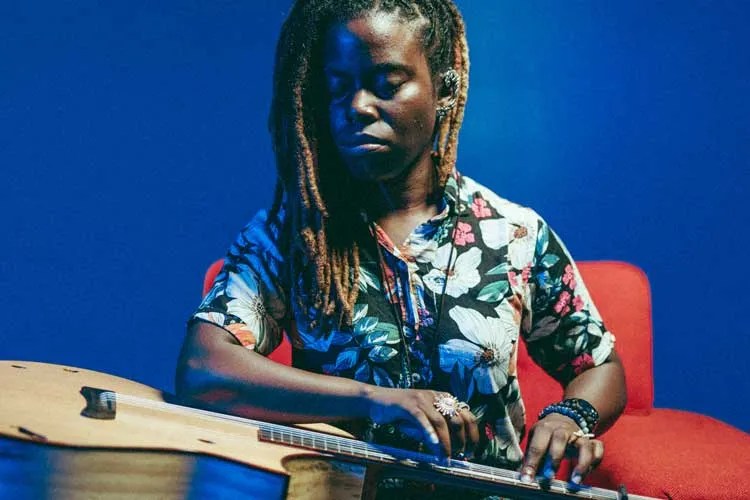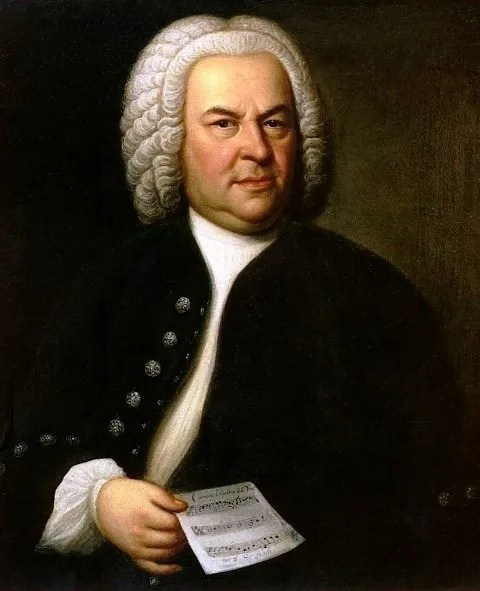UK Guitarist-Composer Laura Snowden Combines Instrument and Voice for Fresh Classical Sounds
From the first notes of Laura Snowden’s March 2024 concert for the Boston Classical Guitar Society, it was clear that the audience was not in for a typical recital. The guitarist opened by singing and accompanying herself in the folk song “Black Is the Colour” before segueing into her transcription of François Couperin’s evergreen Baroque harpsichord work, “Les Barricades Mystérieuses.” What followed was a showcase for Snowden’s versatility and virtuosity in music by J.S. Bach, Heitor Villa-Lobos, Agustín Barrios, María Luisa Anido, three originals, and two of her instrumental folk song arrangements.
Perhaps the most striking aspect of the program was the inclusion of her voice in imaginative ways. Snowden sang lyrics and wordless syllables, and recited spoken-word texts she’d written, to guitar accompaniment. The concert provided a glimpse of her multi-dimensional musical gifts, imagination, and fearless artistic sensibility.
Snowden, 35, grew up in England, where she studied with classical guitar master Julian Bream and launched an international career that has established her as a rising star of her generation. In a conversation at a local cafe during her Boston visit, Snowden shared reflections on her education as a guitarist, the extramusical disciplines that inform her practice regimen, and her adventurous work as a composer-arranger, among other topics.
Studying with Bream
Snowden was born in York, England, to a French mother and British father, and grew up singing and playing Celtic folk music before building a sterling classical guitar résumé. After receiving a scholarship to the Yehudi Menuhin School at 16, she became the first guitarist to graduate from the music boarding school in Surrey, England. From there, it was off to London and the Royal College of Music, where she earned her master’s degree.
A most emphatic endorsement of Snowden’s guitar prowess came when she was awarded a scholarship to study with Bream. Subsequently, the maestro invited her to perform for the 2015 and 2017 Julian Bream Trust concerts at London’s venerable Wigmore Hall. Snowden had the extraordinary opportunity to work for four years with Bream on the repertoire. The solo recital programs featured her in world premieres of works by Julian Anderson and Olli Mustonen, and repertoire either commissioned by or associated with Bream. The appearance of Benjamin Britten’s towering Nocturnal and Lennox Berkeley’s Sonatina in the 2015 program testifies to the level of sophistication and confidence Snowden attained while only in her 20s. The reviews were glowing and her visibility increased in the classical world.
ADVERTISEMENT
When Snowden worked with Bream on Britten’s Nocturnal, she recalls, “The way he taught was to say, ‘This is how I would do it, and this is why.’ That was good because he wasn’t telling me what I must do or not do. He would give me really good reasons for why he did things a certain way. For instance, he might say, ‘If I were you, I’d get quieter in this part because the line is going down and has a melancholy, weary feeling.’ The important part was him saying ‘melancholy’ and ‘weary.’ That was the bit you remember. Getting quieter was incidental. He wasn’t just giving a list of instructions; he was giving really interesting ideas that you could hold onto.”
Composing by Instinct
Snowden’s interest in composing and arranging grew during her time at the Royal College of Music when she became a founding member of the alternative folk quintet Tir Eolas with fellow students. The group started out busking around London and later performed throughout Great Britain. Their repertoire embraced Scottish, Irish, and English traditional music, as well as original songs penned by Snowden. The band is currently on hiatus while members pursue other projects, but their music is well documented in YouTube videos and on their album, Stories Sung, Truths Told.
Snowden’s writing has since expanded beyond the realm of the guitar to include commissioned works for diverse instrumentation. Her catalog features original music for guitar quartet and soprano saxophone; string orchestra; solo harpsichord; an ensemble comprising two guitars, string quartet, flute, percussion, choir, and soprano soloist; and much more.

When composing, Snowden seeks to evoke a particular feeling or present a narrative and to capture the exact emotion or flavor of what she is trying to convey. “I did a project a few years ago with dancers that were improvising, and I was as well,” she says. “I felt something new inside myself where I tapped into a kind of energy with more directness than I usually have when composing. I was inspired by the dancers spinning around going faster and faster, and had no choice but to go more and more wild. ‘My Clock Is Broken’ is a piece that I wrote based on that experience. Now when I’m composing, I try to tap into that instinctive feeling.”
Snowden is open to all compositional challenges. “Whatever anyone asks me to write I always find interesting,” she says. “I’d like to get into writing music for visual mediums, whether in theater or film and videos. The way I think is so visual that I feel what I write would make a good match.”
Alive in the Moment
Snowden says her practice regimen used to include warming up with various technical exercises and etudes, but these days she goes straight into the music. Her current practice sessions are also informed by other artistic disciplines, drawing on what she is learning in contemporary dance and theater classes.
ADVERTISEMENT
“The principles for my practicing are inspired by actors and Konstantin Stanislavski’s approach to training actors,” she shares. “It’s about having your feelings be fresh every time you play and being present and alive in the moment. For me, a lot of it is trying to feel comfortable and at ease. Imagination training is also really important. I try to make my imagination be alive every single time I practice.”
The benefits of Snowden’s practice come across in her relaxed stage presence. In addition to her musical preparation, she currently handles all of the business aspects of her career. During her Boston concert, she half-jokingly stated to the audience that the only place she can really relax is on the stage. “I think there is a certain focus when you are onstage because you have heightened awareness and are really in the moment,” she says. “I benefit from that because there is so much admin work to do all the time that’s a bit scatty. You’re always doing one thing but could at any point get your phone and start replying to stuff. But you can’t do that onstage.”
Changing Modes
Snowden’s highly polished guitar playing is one among various modes she employs to express her seemingly boundless creativity. “It wouldn’t matter to me which form I used,” she shares candidly. “If my dancing was accomplished enough that I could express myself through it, I would be very happy doing that. It doesn’t need to be the guitar specifically. But the guitar is a good thing for me because I have the skills and experience to express things through it more easily.”
Snowden finds the voice to be a natural extension of her guitar work and goes beyond simply singing lyrics in her pieces with vocals. Among the original songs she presented at her Boston concert was “The Trap,” a fantasy story told with spoken and sung words and swooping vocalise. In “This Changing Sky,” her guitar created an atmospheric instrumental texture, into which she wove quiet vocal lines bent slowly downward, producing a haunting effect. “I think there is something quite beautiful and touching about someone singing with the guitar, and I thought it would be nice to have a little bit of that in my concerts,” she says.
Lately, Snowden has been playing guitar concertos. She appeared with the Berkeley Ensemble in Luton, England, for performances of Malcolm Arnold’s Concerto for Guitar and Chamber Orchestra. A work commissioned by Julian Bream in 1959, it features a middle movement in homage to hot-club jazz giant Django Reinhardt. Snowden premiered another concerto, Augenlider by Lisa Streich, with the Deutsches Symphonie-Orchester Berlin, and gave a subsequent performance with the BBC Orchestra. The piece is an evocative, airy soundscape that requires the guitar soloist at times to play the short wires of a kitchen tool. “For the performances, I had an egg slicer attached to my guitar with a contraption made by Christopher Dean, who built my guitar,” Snowden details. “I had to pluck the egg slicer’s tiny strings as well as the guitar strings.”
ADVERTISEMENT
Owing to Snowden’s wide-ranging interests and repertoire, she is often on the bill with performers of differing styles. At last year’s Masters of Tradition Festival, in Bantry, Ireland, she played a set blending classical solos with her folk song arrangements in a program she shared with Irish traditional guitarist Steve Cooney and singer-songwriter Luka Bloom. In November, she will appear at Guitarissomo, a festival in Germany that will bring together classical and fingerstyle guitarists from Spain, Argentina, Germany, the United States, and, of course, England.
Exploring New Paths
At this writing, Snowden is preparing to release her debut solo album, This Changing Sky, which will showcase her range as a player and composer—spanning spoken word with guitar, duets with violin and with tenor saxophone, solo guitar pieces, and instrumental and vocal arrangements of Irish folk songs.
She is deeply committed to exploring the creative corners of her artistic persona, and fully open to future possibilities. “I go through different phases in my life, so it’s very possible that some new thing will start up in a couple of years,” she posits. “When I was doing the Julian Bream Trust concerts, I was really into that, but then I wanted to explore other sides of myself as well. I was doing the folk band, composing, and writing songs at the same time.”
Snowden acknowledges that she previously had mixed feelings about exploring those other sides, out of fear of not doing what she was expected to as a classical guitarist. But she now feels the confidence to follow her own paths, wherever they may lead. “I think about the years I hope I have left to do these things,” she says. “It would be a shame to go to this level to have a career in the arts and not really do the art you want. I plan to give it a go doing what I most want.”
ADVERTISEMENT

What She Plays
Laura Snowden plays a 2006 Christopher Dean guitar with a 650mm scale fretboard, Swiss Alpine spruce top, and Madagascar rosewood back and sides. The guitar is strung with D’Addario’s EJ45 Pro-Arté normal tension set. —MS
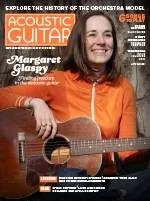
This article originally appeared in the September/October 2024 issue of Acoustic Guitar magazine.


